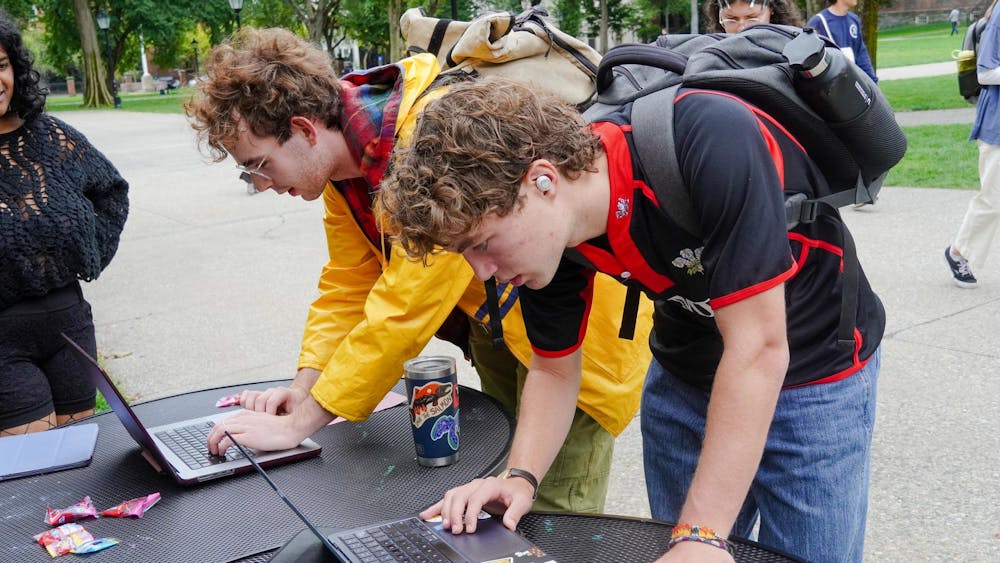With the 2024 presidential election fast approaching and the University considering changes to legacy admissions, The Herald polled 1,177 undergraduates about their opinions on the issues facing Brown students.
The poll was conducted between Sept. 24 and 26, prior to the University’s announcement that Brown will not divest from 10 companies with ties to Israel. The poll offers critical insights into the student body sentiment towards national politics, campus life and University policy.
The poll found that most Brown undergraduates favored the divestment proposal, The Herald previously reported.
Here are five key takeaways from The Herald’s fall poll. More data is available on The Herald’s interactive data dashboard.
A majority of students plan to vote for Harris
A whopping 91% of eligible students plan to cast their ballots for Vice President Kamala Harris on Nov. 5. A mere 4.9% plan to vote for former President Donald Trump. With approximately three-quarters of students identifying as somewhat or very liberal, this outcome is no surprise.
The character of the candidate, reproductive healthcare and the Supreme Court remain the primary considerations for Harris supporters at Brown. Crime and safety, the economy and foreign policy were most persuasive for students who plan to support Trump.
Three-quarters of Brown students said they plan to vote this November, with 9% unsure and 16% saying that they will not vote. Of those who were unsure of voting or will not vote, nearly half were ineligible and one-quarter said that they were not enthusiastic about any of the candidates.
Brown staff have donated 226 times more to Harris’s and President Joe Biden’s campaign than to Trump’s, The Herald previously reported.
Students from low-income backgrounds are less supportive of legacy admissions
After a review of admission policies by a University committee concluded last March, Brown said that it would continue to employ legacy preferences in admission pending input from the Brown community.
The Herald’s poll found that nearly 60% of respondents somewhat or strongly opposed legacy preferences in admissions. This animosity is stronger among those from low-income families and those who disapprove of Paxson.
Increased support for legacy admissions comes from legacy admits themselves, though 46% do not approve of the practice.
The University gives legacy preference to students who have at least one parent who graduated from Brown with an undergraduate degree. In justifying legacy admissions, the committee that analyzed the policy said “legacy preferences create a sense of community and loyalty among Brown graduates.”
They also said legacy applicants “tend to be exceptionally well-qualified, with academic records that are stronger than that of average matriculants. They are also more likely than others to accept offers of admission.”
The committee said that “removing legacy preferences could lead to somewhat more diversity in the group of admitted students.” This year, the University saw a 40% drop in the share of Black first-years and a 29% drop in Hispanic first-years.
Around one-third of students disapprove of Paxson, down from last semester
About 34% of students disapprove of Paxson, The Herald found. One fourth of students approve of Paxson, with 41% of respondents saying that they neither approve nor disapprove.
Paxson’s disapproval rate fell 24 percentage points from its peak of 58% last semester.
In the spring, some student groups criticized Paxson for her handling of campus protests, which included an eight day hunger strike in support of divestment. At the time, Paxson declined the protestors’ demand that the Corporation vote on a divestment resolution at its February meeting. The Corporation’s eventual vote — which ruled against divestment — was conditioned in an April deal in which student organizers agreed to voluntarily end a Main Green encampment.
First years, who are still new to campus, do not have strong opinions on Paxson, with almost 59% of them expressing they neither approve nor disapprove of the president. Paxson found support with Jewish students, with around 52% expressing approval. Students who identified as very liberal had around a 60% disapproval rate.
Nearly 40% of students are single and searching
Though a plurality of students — 29% — are in long-term relationships, nearly 40% are single and looking for a relationship or something casual.
Upperclassmen are more likely to be in a long-term relationship when compared to underclassmen. Freshmen are the most likely to be looking, with 44% searching for a relationship or something casual. With the low percentage of freshmen in long-term relationships, they have the highest percentage of students who are single and not looking for a relationship.
Female respondents were less likely to be looking for a partner, with about 30% content with not being in a relationship. Students who identified as straight were more likely to be in a long-term relationship compared to those who were not straight. Athletes and legacy students were also more likely to be in a relationship compared to their counterparts.
Three in five undergraduates use Sidechat, 15% daily
Around 60% of students indicated that they use Sidechat, an anonymous social media platform that allows students to post to university-specific communities. The platform has gained popularity on campus since 2022, inciting criticism from students and administrators about content posted to the platform.
Students have reported instances of antisemitic and anti-Muslim harassment on the anonymous platform. University administrators, including Paxson, have warned about harassment on the app.
First-year students were least likely to use the app, which requires a University email to sign up for Brown’s page. Students who are single are more likely to use the platform daily compared to students in a relationship. In addition, liberal students use the app more often.
Almost 64% of male students used the platform compared to around 58% of female students.
Editor’s Note: The Herald’s semesterly poll was conducted between Sept. 24 and Sept. 26, 2024. All responses were analyzed and weighted by class year using R Version 4.3.2. Polls were conducted at three locations around campus. The poll was analyzed by Owen Dahlkamp, Ryan Doherty, Abby Donovan, Ciara Meyer, Claire Song, Elise Haulund, Grace Hu, Manav Musunuru, Sanai Rashid, Talia LeVine, Megan Chan and Maya Kelly. It received 1,177 responses.

Owen Dahlkamp is the managing editor of newsroom on The Herald's 135th Editorial Board, overseeing the paper's news operations. Hailing from San Diego, CA, he is concentrating in Political Science and Cognitive Neuroscience with an interest in data analytics. In his free time, you can find him making spreadsheets at Coffee Exchange.

Ryan Doherty is the managing editor of digital content and vice president of The Herald's 135th editorial board. He is a junior from Carmel, NY who is concentrating in chemistry and economics. He previously served as a university news and science & research editor, covering faculty and higher education.





